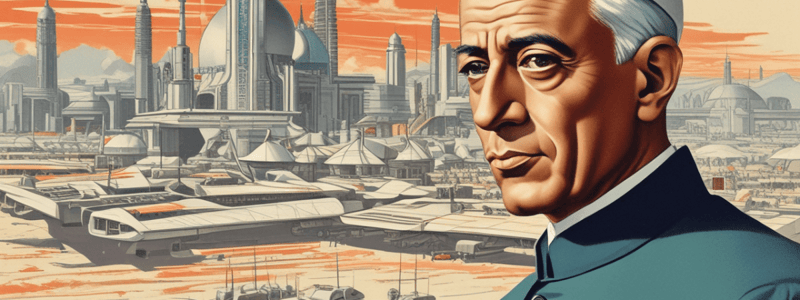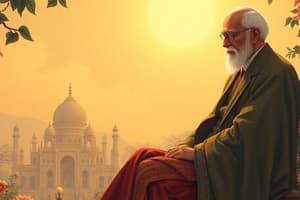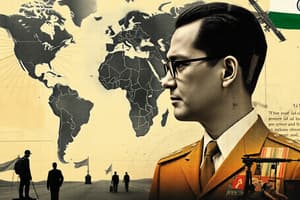Podcast
Questions and Answers
What were the three major objectives of Nehru's foreign policy?
What were the three major objectives of Nehru's foreign policy?
- To strengthen relations with the US, promote economic development, and protect territorial integrity
- To promote peaceful coexistence, protect territorial integrity, and preserve sovereignty
- To promote rapid economic development, protect territorial integrity, and preserve democracy
- To preserve the hard-earned sovereignty, protect territorial integrity, and promote rapid economic development (correct)
What was the strategy adopted by Nehru to achieve his foreign policy objectives?
What was the strategy adopted by Nehru to achieve his foreign policy objectives?
- Alignment with the US
- Pro-communist foreign policy
- Alignment with the Soviet Union
- Non-alignment (correct)
Which party wanted India to follow a pro-US foreign policy?
Which party wanted India to follow a pro-US foreign policy?
- Indian National Congress
- Communist Party of India
- Socialist Party of India
- Bharatiya Jan Sangh and the Swatantra Party (correct)
What was the policy emphasized by India's development strategy during Nehru's era?
What was the policy emphasized by India's development strategy during Nehru's era?
What was the reason for the unease in Indo-US relations during the 1950s?
What was the reason for the unease in Indo-US relations during the 1950s?
What was the main reason for India not joining either of the two camps during the Cold War era?
What was the main reason for India not joining either of the two camps during the Cold War era?
Who was Nehru's counterpart in correspondence regarding foreign policy?
Who was Nehru's counterpart in correspondence regarding foreign policy?
What was the focus of India's foreign policy during Nehru's era?
What was the focus of India's foreign policy during Nehru's era?
What was the significance of India's non-alignment policy during the Cold War era?
What was the significance of India's non-alignment policy during the Cold War era?
What was the global context in which India gained independence?
What was the global context in which India gained independence?
What was the impact of the Cold War era on India's foreign policy?
What was the impact of the Cold War era on India's foreign policy?
What was the focus of India's contribution to the United Nations during Nehru's era?
What was the focus of India's contribution to the United Nations during Nehru's era?
What was the global context in which India gained independence?
What was the global context in which India gained independence?
Which of the following was NOT a concern for India immediately after Independence?
Which of the following was NOT a concern for India immediately after Independence?
What is enshrined in Article 51 of the Indian Constitution?
What is enshrined in Article 51 of the Indian Constitution?
What was Jawaharlal Nehru participating in as an independent nation-state?
What was Jawaharlal Nehru participating in as an independent nation-state?
What was one of the pressures created by Partition?
What was one of the pressures created by Partition?
When did Jawaharlal Nehru participate in a debate in the Constituent Assembly?
When did Jawaharlal Nehru participate in a debate in the Constituent Assembly?
Flashcards
Nehru's foreign policy objectives
Nehru's foreign policy objectives
To preserve India's newly gained independence, safeguard its territorial integrity, and accelerate economic development.
Non-alignment
Non-alignment
A policy of not aligning with any major power bloc during the Cold War, allowing India to pursue its own interests.
Nehru's foreign policy strategy
Nehru's foreign policy strategy
The strategy adopted by Nehru to achieve his foreign policy objectives, focusing on neutrality and independence.
Import-substitution
Import-substitution
A policy that emphasized domestic production and reduced reliance on imports for economic growth.
Signup and view all the flashcards
Unease in Indo-US relations in the 1950s
Unease in Indo-US relations in the 1950s
India's growing partnership with the Soviet Union during the 1950s caused unease in the US, as they viewed it as an alliance with a communist power.
Signup and view all the flashcards
India's neutrality during the Cold War
India's neutrality during the Cold War
The primary reason India chose not to join either the US or USSR during the Cold War was to preserve its independence and avoid being pulled into a conflict.
Signup and view all the flashcards
Nehru's counterpart in foreign policy
Nehru's counterpart in foreign policy
K.P.S. Menon was Nehru's close associate and a key figure in India's foreign policy, often exchanging letters and discussing strategies with him.
Signup and view all the flashcards
Focus of India's foreign policy under Nehru
Focus of India's foreign policy under Nehru
The focus of India's foreign policy under Nehru was to advocate for global peace and reduce Cold War tensions, promoting a peaceful world order.
Signup and view all the flashcards
Significance of non-alignment during the Cold War
Significance of non-alignment during the Cold War
India's non-alignment policy during the Cold War allowed it to make independent foreign policy decisions without being pressured by either superpower.
Signup and view all the flashcards
Global context of India's independence
Global context of India's independence
The global context of India's independence was the beginning of the Cold War, a period of heightened tension and rivalry between the US and USSR.
Signup and view all the flashcards
Impact of the Cold War on India's foreign policy
Impact of the Cold War on India's foreign policy
The Cold War significantly influenced India's foreign policy, leading to its adoption of a non-aligned stance.
Signup and view all the flashcards
India's UN contribution during Nehru's era
India's UN contribution during Nehru's era
India actively participated in United Nations peacekeeping operations during Nehru's leadership, showing its commitment to international peace and security.
Signup and view all the flashcards
Global context of India's independence
Global context of India's independence
India's independence occurred as the world was recovering from a devastating war and facing challenges related to reconstruction and global stability.
Signup and view all the flashcards
Concerns of India after independence
Concerns of India after independence
Securing a permanent seat in the UN Security Council was not a major concern for India immediately after independence.
Signup and view all the flashcards
Article 51 of the Indian Constitution
Article 51 of the Indian Constitution
Article 51 of the Indian Constitution enshrines 'Promotion of international peace and security' as a directive principle of state policy, reflecting India's commitment to global peace.
Signup and view all the flashcards
Nehru's participation in world affairs
Nehru's participation in world affairs
As an independent nation-state, Jawaharlal Nehru actively participated in world affairs, engaging in international diplomacy and shaping India's role on the global stage.
Signup and view all the flashcards
Pressure created by the partition
Pressure created by the partition
Partition created pressure on India due to border disputes with Pakistan, leading to tensions and challenges in the early years of independence.
Signup and view all the flashcardsStudy Notes
India's Foreign Policy
- India's foreign policy was influenced by its struggle for freedom and the ideals of non-violence, democracy, and socialism.
- The country gained independence in 1947, coinciding with the start of the Cold War era, marked by political, economic, and military confrontation between the US and USSR.
International Context
- The post-Independence era saw the establishment of the UN, creation of nuclear weapons, emergence of Communist China, and decolonization.
- India had to navigate its national interests within this complex international context.
Nehru's Role
- Jawaharlal Nehru played a crucial role in shaping India's foreign policy as the Prime Minister and Foreign Minister from 1946 to 1964.
- He pursued a policy of non-alignment, reducing Cold War tensions and contributing to UN peacekeeping operations.
- Nehru's three major objectives were to preserve sovereignty, protect territorial integrity, and promote rapid economic development.
Non-Alignment Policy
- India chose not to join either of the two camps during the Cold War era, maintaining its independence.
- Nehru believed that foreign relations should not be controlled by external forces, and India should maintain its sovereignty.
Challenges
- India faced challenges such as poverty alleviation, reconstruction after World War II, and the British legacy of international disputes.
- Partition created its own pressures, and the country had to navigate its way through the international arena as a new nation-state.
Studying That Suits You
Use AI to generate personalized quizzes and flashcards to suit your learning preferences.




